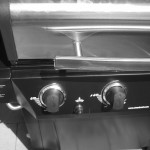True.
 There are millions upon millions of people who fire up their grills everyday in this country. I’m usually not one to exaggerate things, but I honestly believe that I could be given the title “World’s Worst Griller”. I don’t even want to think about how many steaks, hamburgers, pork chops, and chicken breasts I have scorched on the grill and had to throw away! It really is like the movie Ground Hog Day, because it happens over and over and over again. Usually the scenario goes something like this; I put some steaks on the grill, set the grill to medium or medium high heat, walk away to do something else for just a few minutes (e.g., pick up the yard, pick some herbs in the garden, play with the dog) and return to steaks that are on fire. One day I returned to a grill that was entirely engulfed in flames. I couldn’t turn the gas off with the plastic handles on the front of the grill because they were completely melted; I had to use a fire extinguisher. Some people love grilling with charcoal and others love propane, but is using one healthier than the other? It appears that the answer is yes, and its propane. Authors of one study (Farhadian et al., 2010) which examined polycyclic aromatic hydrocarbons (PAH,s) which are carcinogenic compounds, reported that grilling with charcoal produced significantly more PAH’s than grilling with propane. One reason grilling may produce more PAH’s than propane is that charcoal usually burns hotter, so there is an increased risk of charring the meat. Some additional tips to reduce PAH’s in grilled food include turning meat frequently, partially cooking meat in the microwave before grilling it, removing any burnt parts, and marinating the meat in lemon juice before cooking.
There are millions upon millions of people who fire up their grills everyday in this country. I’m usually not one to exaggerate things, but I honestly believe that I could be given the title “World’s Worst Griller”. I don’t even want to think about how many steaks, hamburgers, pork chops, and chicken breasts I have scorched on the grill and had to throw away! It really is like the movie Ground Hog Day, because it happens over and over and over again. Usually the scenario goes something like this; I put some steaks on the grill, set the grill to medium or medium high heat, walk away to do something else for just a few minutes (e.g., pick up the yard, pick some herbs in the garden, play with the dog) and return to steaks that are on fire. One day I returned to a grill that was entirely engulfed in flames. I couldn’t turn the gas off with the plastic handles on the front of the grill because they were completely melted; I had to use a fire extinguisher. Some people love grilling with charcoal and others love propane, but is using one healthier than the other? It appears that the answer is yes, and its propane. Authors of one study (Farhadian et al., 2010) which examined polycyclic aromatic hydrocarbons (PAH,s) which are carcinogenic compounds, reported that grilling with charcoal produced significantly more PAH’s than grilling with propane. One reason grilling may produce more PAH’s than propane is that charcoal usually burns hotter, so there is an increased risk of charring the meat. Some additional tips to reduce PAH’s in grilled food include turning meat frequently, partially cooking meat in the microwave before grilling it, removing any burnt parts, and marinating the meat in lemon juice before cooking.
Reference
Farhadian A, Jinap S, Abas F, Sakar Z: Determination of polycyclic aromatic hydrocarbons in grilled meat. Food Control (2010), Vol 21, pps. 606-610.
